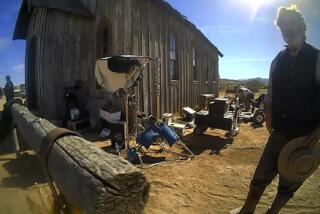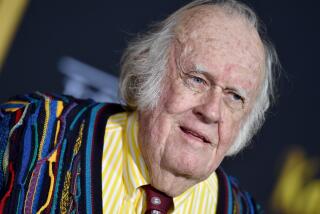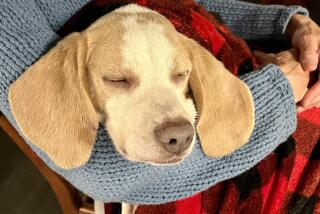A Beast’s Best Friend : One Man Is Rescuing Animals From the Hellish Furnace of Kuwait
- Share via
BURGAN OIL FIELD, KUWAIT — John Walsh is ready to return to Boston. But not before he tries to save the four oily ladies.
On a dirty gray May morning under an oil cloud, Walsh--the tall, thin crusader who came to the rescue of the few remaining animals in Kuwait City’s zoo after the Iraqi invasion--is in the macabre depths of the Burgan oil field, one of the biggest in the world.
It is a smoking furnace, often pitch dark in the middle of the day, with every surface blackened by soot and oil spewed by the most densely concentrated grouping of Kuwait’s blazing wells.
The truck tracks ahead weave on and off the road, to avoid the fire and fumes from wells sometimes only yards on either side. In one oil lake at the road’s edge are the remains of two trucks and a small car, where a few days earlier two British journalists and three Indian oil field workers burned to death. As a plume of roiling smoke looms ahead across the path, Walsh, who doesn’t scare easily, puts on a gas mask.
Walsh, 50, is director of field projects and assistant general director of the London-based World Society for the Protection of Animals. For two months in Kuwait, from a hotel room as disheveled as a student’s, he has emerged soon after dawn every morning, in an immaculate shirt, to do battle for defenseless beasts.
Each evening after dark he has returned, oil-spattered and usually lugging a sack of exploded Iraqi mortar shells or other discoveries. A New England Yankee of the classic mold, Walsh, who works out of the society’s Boston office, has done this sort of thing all over the world, but the plight of the four oily ladies, and Kuwait, includes a challenge he hasn’t seen before: disinterest.
The “ladies” are Thoroughbred mares, abandoned on an estate deep in the Burgan field. The big walled compound is owned by Sheik Jabbar al Ahmed al Sabah, the wealthy emir of Kuwait, leader of the country, who has left the horses to their fate because, as a government spokesman put it, he probably thought them already dead.
They aren’t far from it. The compound is surrounded by roaring well fires, its rows of date palms now sticky and funereal from the misting oil. As Walsh sets out to find the horses, he grabs his gas mask again.
The first time here, he found himself walking into trees--disoriented, he thinks, from a whiff of gas. Unburned hydrogen sulfide has been everyone’s fear because of its toxicity.
The horses aren’t to be found near their only source of water, a cloudy yellow pond. Their hoof prints in the oil-soaked sand go in and out of the estate’s immense aviary, most likely emptied of exotic birds by underfed Iraqi troops. Finally, the horses turn up, quietly standing in another grove of dying trees, nibbling at a few new grass shoots only partly covered with oil. After more than three months of such fodder, their ribs stand out like radiator pipes.
Walsh leads them to a partly sheltered area, gives them hay, concentrated alfalfa pellets and vitamin-infused fresh water. In return, two of them swing their rumps around to try to give him a kick.
“Hey, look at that,” he says, pleased.
The first time he fed them, they were too listless to try. He stays as close as they allow, since he will soon have to load them in a horse trailer--if he can find one with wheels. The Kuwaitis joke that the Iraqis must have liked the taste of rubber. In fact, the Iraqis stole thousands of tires to line bunkers.
Walsh himself has lost 28 pounds since coming to Kuwait, two days after its liberation by the allied forces.
“I just don’t have time to eat,” he explains.
But even as he rips open his lunch, another MRE--the ubiquitous Meal Ready-to-Eat supplied by his many supporters among U.S. troops here--he eats only a few bites, then sets the rest down for any wandering cat.
Walsh is an enthusiastic scrounger himself and can hardly go by a deserted Iraqi bunker without poking his head inside. He has collected rubber boots, work uniforms for animal rescue volunteers and even netting once used by Iraqi soldiers to catch migratory birds for dinner. He uses the nets now to catch injured birds for treatment.
For himself, there have been military boots, pocket knives, helmets, camouflage suits and today, on the way out of the compound, a pistol.
“It’s loaded,” Walsh says, happy again. “That’s a real war trophy.”
He works the slide action, takes out the clip, pulls the rusted hammer back. Then he thrusts his arm out the window and fires an exuberant shot into the smoky sky. It will be a nice addition to his extensive personal gun collection. He’s a collector, not a hunter. He also collects cars, including a restored 1965 Land Rover, as well as antique farm equipment.
Walsh is probably one of the best friends the Persian Gulf’s animals have ever had. In his insistently polite way, he has cajoled, written letters, enlisted the powers that be to help.
He wrote Gen. Norman Schwarzkopf, commander of Deserts Shield and Storm, to complain that prewar target practice by U.S. troops in Saudi Arabia was killing and maiming camels.
“Our forces here will take every precaution to prevent occurrences of this type,” the general wrote back--and apparently he meant it. Walsh later heard soldiers complaining of the tender-hearted new rules for target practice that had come down from the very top.
At the Kuwait zoo, where Iraqi soldiers had eaten, killed for sport or fed to one another all but 28 of the more than 400 animals once kept there, he cleaned up the cages and got food and veterinary help.
U.S. Special Forces soldiers volunteered to repair trucks to haul food and water, feed the beasts and weld cage doors back together. The Army’s Civil Affairs units provided veterinarians.
Walsh also trucked up hay from Saudi Arabia to help feed the remnants of Kuwait’s dairy industry; farmers’ cattle, goats and sheep; abandoned race horses; feral cats, and all manner of wildlife. He even got food to Bedouin camel herds.
He says, “I think the camels have done pretty well, actually”--at least the ones away from the oil and mine fields. But doing “pretty well” still means some grim figures.
Walsh believes government estimates that only 2,000 of Kuwait’s 10,000 camels have survived. He thinks that fewer than 2,000 of the nation’s 15,000 cows made it; that shipments from Australia have restocked perhaps 40,000 to 50,000 of the 800,000 sheep, and that just 500 of the 3,000 horses survived.
“Horses really did poorly in this country,” he says. And most of those still alive are in terrible shape.
But what troubled Walsh more last week as he prepared to leave is an attitude about animals he says he hasn’t found in his other campaigns. In Latin America and other parts of the world, people have generally volunteered to help him save their animals.
When Walsh confronted the many owners of dying and neglected stock here, the Kuwaitis often responded with a point of view startling to the Western animal-protectionist tradition: “It doesn’t matter. We can always buy more.”
“There were some really noble events,” says Walsh. “Individuals went to great risk by hiding their horses from the Iraqis, in their homes and courtyards. And many fed them as best they could.”
But others, even though hay is now readily available, have simply abandoned animals as they have other damaged possessions. Walsh says he believes there is some truth to the claim by many Kuwaitis that they are distracted by the tragedies of the occupation and war. And it is also true that animals in Saudi Arabia and Kuwait are not valued as companions or as species.
“There are no spokesmen for animals here,” says Walsh.
The day before he tries to move the horses, Walsh goes to see Saqer al-Boaijan, an official in the Ministry of Information. Al-Boaijan confirms that the abandoned estate belongs to the emir.
“He got it when he was governor,” he says.
Walsh asks him to pass word along to the emir that his horses, if Walsh can get them out, will be placed in the care of Kuwait City’s police animal grooms. Al-Boaijan agrees, then bursts into praise about Walsh’s projects.
“It’s great what you’re doing,” he says, shaking his head with admiration. “You’re almost alone, aren’t you?”
“They know that,” says Walsh softly, as he walks away. “But I haven’t seen a lot of people surface to help me. The people who have surfaced here, I paid to work with me.”
In other circumstances, Walsh has been able to leave behind animal-rights advocates, public animal-control agencies and other permanent structures. Here, his bureaucratic legacy may be a revived zoo, though as he has turned control back over to the old director, feeding schedules have been reduced to one meal a day and the zookeepers have seen a sharp cut in pay.
But one helper Walsh gladly pays is the sole truck driver he’s found who will drive his tow truck into the heart of the Burgan oil field, dragging a horse trailer. It turns out that this was because the driver had no idea what the oil fires looked like.
But Walsh perseveres, wheedling him along as, wide-eyed with fear, the driver careens through the smoke.
The four oily ladies are now recuperating in Kuwait City.
More to Read
Sign up for Essential California
The most important California stories and recommendations in your inbox every morning.
You may occasionally receive promotional content from the Los Angeles Times.










